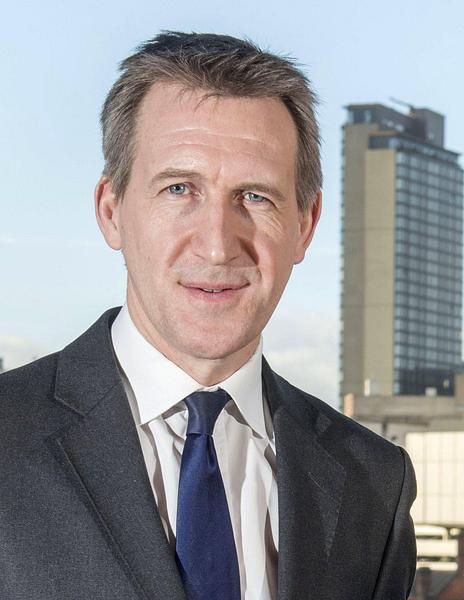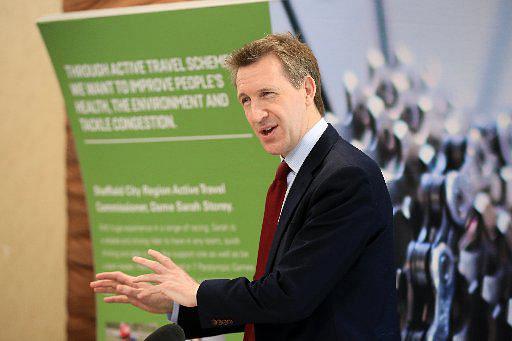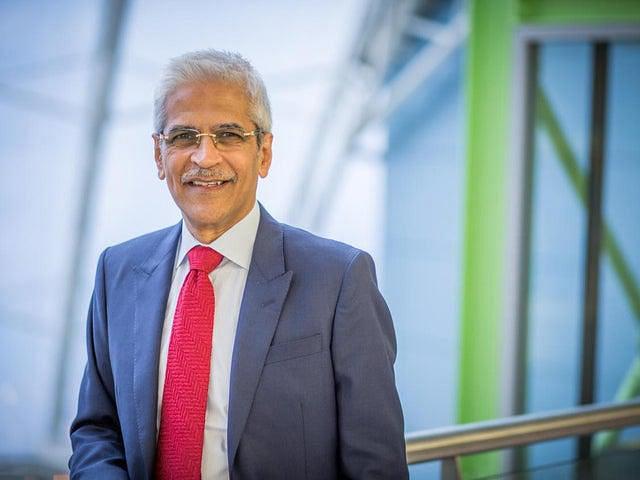"It is time that the action matches the rhetoric"
Yorkshire’s most vulnerable citizens are facing widening health inequalities due to a lack of sustained long-term investment in the North, senior health leaders have warned.
The Government has been urged to make good on its “levelling-up” commitment as an already-stretched NHS and social care system is set to face further pressure from a hidden burden of future disease and early deaths.
New analysis for The Yorkshire Post from the Northern Health Science Alliance (NHSA) showed female life expectancy at birth fell in the region over the last three years - while the English average rose.
While male life expectancy has risen since 2015 - it has done so by roughly half of the equivalent figure for England. At the same time, obesity and diabetes rates have risen higher than in the country as a whole.
Women and men in Hull have the lowest life expectancy in the region
Since 2001, life expectancy for both men and women has increased at a slower rate in Yorkshire than the country as a whole, by just 2.1 years to 82.4 for women, whereas the English average is now 83.2; and from 75.6 years to 78.7 years for men, an increase of 3.1 years, compared to an English average of 79.6.
Over the last three years, the prevalence of obesity increased in Yorkshire by 8.9 per cent compared to seven per cent nationally; while the rate of diabetes increased by seven per cent compared to the English average rising by 5.9 per cent.
Lead author Dr Luke Munford, a lecturer in health economics at the University of Manchester, said mortality rates for May, which take into account Covid-19 and non-coronavirus deaths were “some of the highest in the country”.
Unless “urgent action” was taken, Yorkshire’s health inequalities will only get worse, he warned.
“Coupled with this, Yorkshire and Humber has some of the highest unemployment rates in the country and these are rising much faster than average,” Dr Munford said. “We know the North suffers as a result of health and economic inequalities and this data suggests that things are getting worse and that urgent action needs to be taken.”
It comes just days after the British Medical Association wrote to MPs in the North East warning that ”‘concerted action” is required to tackle the “entrenched problem” of health inequalities as the region has suffered disproportionately during the pandemic.
The NHSA, which brings together leading northern universities, research-intensive NHS trusts and Academic Health Science Networks, said poor health accounts for one third of the productivity gap between the North and the rest of the UK, at a cost of £13.2bn a year.
Long-term investment into cutting-edge health technology research could begin to tackle the issue by benefitting local patients first, and create new jobs boosting the northern economy,
NHSA's chief executive Dr Séamus O'Neill said: “For years there has been rhetoric in Government about tackling health inequalities. It is time that the action matches the rhetoric. This has been 50 or 60 years in creation, it is going to take at least that long to address these issues.
“There has to be an answer that is locally owned and understood. Whitehall has got to support the regions by providing them with the resource and the space and the freedom to act.”
Sheffield City Region Mayor and Barnsley Central MP Dan Jarvis said devolved investment could be used to combat generations of structural health inequalities in the North.
Mr Jarvis said: “Levelling up isn’t just about the economy, it has to be about the levelling up when it comes to health inequalities.
“There are very few silver bullets, and essentially what we need is a long-term programme of sustained investment within the health and well being of the population.”
A spokesperson from the Department of Health and Social care said: “The Government remains committed to levelling up – including health outcomes - and we are committed to spreading opportunity across this country.”
"Covid has hit the North harder"
Stark disparities in poor health in the North have been brought to the fore in “devastating fashion” due to coronavirus, leaving it to suffer the “biggest blow” from the pandemic, a leading researcher has said.
The Northern Health Science Alliance (NHSA) chief executive Dr Séamus O'Neill said there is a real risk that if lessons are not learned, then those who currently face the most disadvantage will eventually pay the highest price.
He told The Yorkshire Post: “Covid has hit the North harder and the North is less well able to sustain that kind of blow.
“The effects of covid are disproportionately felt in the North and equally in Yorkshire because it disproportionately affects areas of deprivation. It is unfairness on top of unfairness.”
Official data revealed the May covid 19 mortality rate in Yorkshire and the Humber was 26.3 deaths per 100,000 people - 31.5 per cent higher than the English average, prompting, the British Medical Association to this week call on MPs in the north to take “urgent, concerted action” to tackle health inequalities.
The call to action comes as five areas in Yorkshire were included on a list of 20 councils facing the worst coronavirus outbreaks in England, with Bradford, Sheffield and Kirklees identified in Yorkshire as needing “enhanced support”, and Rotherham and Barnsley marked as a “concern” according to a classified document leaked to the Observer and the Guardian.
Dr O’Neill said a lack of sustained long-term investment in tackling poor health in the North is exacerbating generational health inequalities and helping to widen the North-South health divide.
New analysis from the organisation shows that since 2001, life expectancy for females is increasing at a slower rate in Yorkshire than the English averages.
Areas with the consistently low life expectancy for females include Hull, Barnsley, Doncaster, Rotherham, Bradford, Calderdale, Kirklees, Leeds, and Wakefield.
While over the same period English life expectancy for males has increased, the rate is slower than the English average, and the gap appears to be getting bigger – especially for West Yorkshire.
The NHSA analysis also showed the prevalence of obesity in Yorkshire and the Humber since 2015 is increasing much faster than the English average, with the much higher rates of obesity in Barnsley, Bassetlaw, Bradford City, Bradford District, Doncaster, North East Lincolnshire, North Kirklees, Rotherham, Scarborough and Ryedale, and Wakefield.
Dr O’Neill stressed the need for the pandemic to be a watershed moment in creating the social and political will to build a society that values everyone’s health now and in the long term.
“If people continue to see sustained inequality it is not a matter of what party they vote for - people will just stop participating,” he said.
“I think there is a real risk of having a very disillusioned and disengaged population who don’t see the value of government.”
Dr O’Neill said using the strengths of Yorkshire’s NHS, hospitals and other assets to attract industry investment over a sustained period should be a priority.
He said: “There is no shortage of passion and ideas or innovation in the North - what we need is the space to work and the resource to work which has been disproportionately based in Whitehall so far.
“There are 16 million people in the North, and we are talking about a few high profile investments, we should be talking about many many more of those large scale investments.
“The fact that there are not that many big government initiatives or big government investments in the North is quite telling.”
The NHSA is calling on the Government to “overinvest” in the pockets of excellence to give the North the opportunity to “compete” after underinvestment for decades.
Dr O’Neill said: “The time is now to act, we can’t do anything about the missed opportunities over the years that have gone but this will be perpetuated, the lack of opportunity and the disadvantage is compounded by every year and every generation that goes past.”
"The Government remains committed to levelling up"
The Government insists it is committed to levelling up – including health inequalities - during and after the pandemic.
It said action is being taken to tackle these disparities following these unprecedented times.
A Department of Health and Social Care spokesperson told The Yorkshire Post: “The Government remains committed to levelling up – including health outcomes - and we are committed to spreading opportunity across this country.
“It is clear Covid-19 has disproportionately impacted certain groups and we are determined to take the right steps to protect them and minimise their risk.
“Following the findings of Public Health England reports published last month, the Equalities Minister is taking forward vital work to tackle these disparities and protect our most vulnerable communities from the impact of the virus.”
"The Government wasn’t doing enough before the crisis"
The aftermath of the coronavirus pandemic should be used as a “catalyst for change” to empower and invest in devolution to combat the glaring generations of structural health inequalities that are holding back Yorkshire communities, the elected mayor of the Sheffield City Region has said.
Dan Jarvis made the call as medical and health experts and charities warned of the widening health inequalities of the most vulnerable as they face major challenges during the coronavirus pandemic.
Mr Jarvis, a leading proponent of One Yorkshire devolution, told The Yorkshire Post: “The coronavirus crisis has brought to the fore, many of the structural health inequalities that we have been dealing with for generations.
“The Government wasn’t doing enough before the crisis. If levelling up is about anything, it’s about levelling up life expectancy.
“Coronavirus has been horrendous, I’ve dealt with people who have lost family members, who have had businesses gone under... but what I am determined to ensure is that some good comes out of it and that we use coronavirus as a catalyst for change.
“You cannot solve health, economic and social injustice from Westminster. We need to see a radical transformation in the way that the country is run.
“Devolution provides huge opportunities to make better decisions and to make better use of resources.”
He called for long-term investment in Yorkshire’s assets, including Sheffield Hallam University’s £14m Advanced Wellbeing Research Centre (AWRC), a new unit dedicated to improving the health and wellbeing of the population through innovations that help people move.
He said: “This is a centre of excellence and they are doing some incredibly important academic research looking at some of the challenges that we face in a public health context.”
Mr Jarvis, 47, who is also Barnsley Central’s MP, said long-term investment was also needed in the growth of the Northern Forest, increasing tree cover in an area stretching from Liverpool to Hull .
A letter signed by over 120 cross-party members of Parliament and council leaders last year Mr Jarvis said by investing £500m in the Northern Forest could benefit the economy by as much as £2.5bn.
He said: “The Northern Forest is an initiative of international significance and I’m helping to lead the way and playing my part in growing it. I’m now calling on the Prime Minister to back this project, bestowing a legacy we can all be proud of."
And while he welcomed the Government’s £250m emergency active travel fund released earlier this summer, he stressed travel must be a priority in Yorkshire as lockdown restrictions continue to ease.
He added: “I don’t think the population at large will judge politicians kindly if they fail to seize this important moment for change and that is why despite the horrendous time this has been - let’s try and draw from it the opportunity in better investing in the health and wellbeing of our population.
“That is obviously the right thing to do and obviously good for communities - and there is a wide economic benefit to having a healthier and happier population.
“Investment in people’s health will save money and will reduce the burden and pressures on an already stretched NHS over the longer term.
“Let’s make sure we use this as a catalyst for change to actually invest in the health and wellbeing of our population in the future.”
"I’m getting more health problems"
Across Yorkshire, communities are throwing their collective arms around their most vulnerable with innovative projects designed to tackle the worst of our health inequalities - showing the vital role that charities and community groups play to the region’s social fabric when we need them the most.
Initiatives across the region, often invisible alongside the state infrastructure, who have in many places made the difference between individuals suffering and communities being resilient during these unprecedented times, have spoken out about coping with demand because of the challenges caused by the coronavirus outbreak.
In South Yorkshire, mother-of-two Sheila Dunker-Chinnock, who has spondylosis, a type of arthritis spurred on by wear and tear to the spine, has become a champion in her Dearne Valley community after setting up a “vital” exercise group sparked by concerns for the health and wellbeing of her elderly neighbours when lockdown restrictions started.
For the last two months, the Swinton resident, who herself uses a mobility scooter, has led a weekly Monday chair exercise class outside her bungalow on Charles Street, for six neighbours with underlying health conditions. The group caters for a wide range of disabilities including blindness induced by type two diabetes. The oldest participant is 92-year-old Pat Taylor.
Since the restrictions came in place Mrs Dunker-Chinnock has had mounting concerns that the impact of coronavirus on the NHS and the cancellation of thousands of routine surgeries and appointments could be building up a backlog of ill-health for residents in the area. She has been unable to access her regular injections from her GP which aid her arthritis.
Speaking to The Yorkshire Post, Mrs Dunker-Chinnock, 56, said: “A lot of people round here are already struggling.
“Since the lockdown I’ve noticed it myself - I’m getting more health problems because I’m not able to do much exercise. Some days I’ve been in absolute agony.
“Here there are a lot of bungalows where the elderly live - for quite a few of them they don’t leave their house. Some don’t have any family and are on their own.”
Kathleen Cresswell, 81, who suffers from curvature of the spine, is one of the neighbours who has taken part for the last two months.
Mrs Cresswell, who moved to bungalow street two years ago and lives alone after her late husband William passed away five years ago, told The Yorkshire Post she and her neighbours were reaping benefits for both physical and mental wellbeing.
“It’s really helped for mental health,” the mother-of-two said. “We have a laugh when we are doing it, we do our best as Sheila shows us - some of us can’t lift our legs very far but we have a go.”
Mrs Cresswell, who worked for over 20 years in the catering industry for Wath Main Colliery, stressed the need to expand current programmes due to the chronic health problems that exist within the Dearne Valley.
“There really have been some challenging days during the coronavirus,” she said. “This kind of programme is vital.”
In West Yorkshire, for mother-of-two Gemma Dockerty, who is looking after a recently diagnosed autistic daughter on top of financial challenges brought on by the coronavirus, a Leeds community health initiative has proven to be vital in tough times.
The 28-year-old is one of 2,500 families who have received an active playbox delivered to their homes, by Seacroft organisation Fall into Place, during lockdown, designed to help the health and wellbeing of young families in the most deprived areas of the city.
Her daughter’s condition on the autism spectrum and financial worries has made staying healthy as a young family a difficult task. The charity well-being coordinator has been furloughed from her part-time role with the LS14 Trust charity, while her self-employed partner James Honner, 28, who works as a NHS courier - only started work again recently.
They have relied on savings and the Government bounce-back loans, but did not want to run into debt.
Miss Dockerty said receiving the playbox was a vital “helping hand” for the family, giving her daughters Karla, seven, and Maria, 10, who are unable to attend Grange Farm Primary School, Seacroft as only reception, year 6 and key workers are currently attending, until September, something “to look forward to” and provided positives in a “bad situation.”
She said: “It’s been a lifeline for young families during this pandemic.
“We’ve had tough times. I definitely have concerns about keeping them occupied for such a long time. It’s so important to be able to exercise because it’s easy to get into a bad routine.
“I have concerns for my eldest daughter and her additional needs and autism. We had just got her into a good routine at school before lockdown
“My concern is how the ‘new normal’ will be for my eldest daughter.”
Currently the healthy family box scheme, delivered by Fall into Place in collaboration with Active Leeds, the LS14 Trust, Playful Anywhere and Seagulls Reuse, can only be accessed by residents who live in Seacroft, Gipton and Harehills, Burmantoffs, Richmond Hill, Chapeltown and Armley, due to capacity and funding.
Naomi Roxby Wardle, 28, service co-director for Fall into Place, stressed the need to expand the current initiative due to the chronic health inequalities and high rates of deprivation within West Yorkshire.
She said more must be done to bring deprived areas in the North up to the level of good health enjoyed by people living in London and the South East.
“Austerity has hit hardest in some of these areas,” she said.
“We’ve heard it repeated like a mantra that we are meant to ‘all in this together’ - but I don’t think that is true.
“There are going to be the lasting effects of what coronavirus has done to communities like this.
“Adjusting to the “new normal” is going to be a real struggle - we need to be able to support families during that time. We need long term support.”
"Many of these women are the lifeblood of Asian households"
Mother-of-five Nadera Amini is on a mission - to provide support to the most vulnerable BAME women and girls in the most deprived areas of Bradford and protect future generations from health inequalities that have blighted their families.
The 39-year-old is leading the Bradford activity scheme Nutrition, Advice, Fitness and Selfcare (NAFS) with the goal to educate participants on developing healthy lifestyle habits including food, exercise and families’ daily routines. It is provided in small groups of up to six in the local community.
Currently the healthy families activity sessions, including Zumba, pilates and boxercise, run five times a week with social distancing measures in place and can only be accessed by residents who live in Bowling and Barkerend, due to capacity and funding.
Mrs Amini, a designated community champion in Bradford, stressed the need to expand the current programmes due to the chronic health problems that exist within Bradford, which include high rates of metabolic syndrome, a combination of diabetes, high blood pressure (hypertension) and obesity; diabetes, and high rates of deprivation.
“It is so important to support these women and girls,” she said.
“Many of these women are the lifeblood of Asian households, if they are not well mentally and physically, a lot of the families will suffer eventually in the long term.
“If I was able to provide more support to women from different backgrounds - I think it will help to improve the health inequalities that are so prevalent in Bradford.”
At a time when the Government has been urged to make good on its “levelling-up” commitment, Mrs Amini said the need to improve the long-term health of the region with schemes like those in Bradford should be given priority.
“We are trying to close the generational health inequalities gap,” she said.
“Health conditions like diabetes are very high in our community. It is harder for families to find ways to live a healthy lifestyle when they are living in high deprivation and have health problems.
She added the introduction of more BAME female leadership programmes in Bradford would greatly benefit the community in tackling generational health inequality.
“This can make them leaders, connectors and activators in their local communities.”
"People are going into this pandemic much more vulnerable"
Deprivation spurred on by a decade of austerity has entrenched health inequalities that have been ruthlessly exposed by COVID-19, a leading York-based charity has said.
The Joseph Rowntree Foundation’s (JRF) acting director Helen Barnard said the Government needs to prioritise ending poverty across the region, to improve the health of its population, as families on Universal Credit and Child Tax Credit struggle to afford food and basic utilities, such as gas and electricity. Research out last month by JRF showed that two thirds of families on Universal Credit had slid into debt since the start of lockdown.
The organisation, alongside Save the Children, has called for a £20-a-week increase to the child element of Universal Credit and Child Tax Credit to help the poorest families. Those on Universal Credit currently receive £235.83 per child per month.
She told The Yorkshire Post: “One group we are worried about are families with children particularly because there hasn’t been any targeted help.
“We have been calling for an urgent lifeline for children - because we can see families of children are really getting pulled under.”
Head of UK poverty campaigns at Save the Children, Becca Lyon, added: “By taking action now, we can prevent increased child poverty from becoming a damaging legacy of this pandemic, which has already caused too much suffering.”
There are 1.2m people in the region living below the breadline, with 30,000 more people in Yorkshire living in poverty than five years ago, JRF said.
While more than a fifth of people in Yorkshire live in poverty, what is particularly concerning, the charity said, is that most of this rise was among children - with nearly a third of all children in the region, a total of 350,000 now living in poverty.
Ms Barnard, who is also a member of the West Yorkshire Economic Recovery Board, warned that this figure will grow disportionately for those most vulnerable across the region with a detrimental effect on their health, as a result of the pandemic.
She said: “Across Yorkshire, people in poverty are spread over quite a lot of areas. People in poverty have higher mortality rates from covid.
“Living in poverty means you are much more likely to have underlying health conditions because of the ongoing pressure that poverty puts on your mental and physical health.
“So people are going into this pandemic, much more vulnerable.”
"Health inequalities could increase"
Extra support is needed to push exercise and fitness in areas hit by a “double-whammy” of deprivation and low activity levels as the country moves from crisis management to recovery post-coronavirus, a leading Yorkshire sports organisation has said.
Speaking to The Yorkshire Post Nigel Harrison, the chief executive for the Yorkshire Sport Foundation, said there was a need for a Government push in some of Yorkshire’s most deprived areas where high rates of inactivity could see inequalities rise for the most vulnerable in future.
Mr Harrison said: “We have concerns that there could be greater inequalities and greater health reducations for people which we aren’t then able to support them in the way we would like to.”
The charity which contributes to the government’s agenda to increase the number of people participating in sport and physical activity nationally, works across 15 priority areas across South and West Yorkshire with the highest rates of deprivation and health inequalities identified through analysis of income deprivation domain data (IMD).
In West Yorkshire this includes Seacroft in Leeds, Birkby and Fartown in Huddersfield, and Airedale, Wakefield, while across South Yorkshire, Maltby in Rotherham, Burngreave in Sheffield, Kendray, Barnsley and the Dearne Valley.
Mr Harrison, 52, said: “Our main concerns as we go forward are those health inequalities could increase, with a reduction in the economy which is looking highly likely in the future.
“Our priority is the physical activity angle and how physical activity can contribute to those on low incomes and higher levels of long term conditions and disabilities, who already struggle to be as active as other people.”
He added if health inequalities continued to widen in the North and Yorkshire it would have a detrimental effect on the health and wealth for the region.
Mr Harrison said: “We know when the economy goes down then there are higher levels of deprivation and all the social and economic consequences of that.”
"You need to reach out to those people very early"
Yorkshire and the North have been “devoid of investment and energy” and the recovery from covid-19 should be used to place targeted long-term investment into local communities, a health leader from Bradford has said.
Professor Mahendra Patel, from the University of Bradford, said emphasis should be placed on positive early childhood development initiatives to fight against generational health inequalities.
He made the call as new analysis from the Northern Health Science Alliance showed the prevalence of diabetes in Yorkshire since 2015 is increasing much faster than the English average, with higher rates of diabetes in Barnsley, Bassetlaw, Bradford City, Bradford District, Doncaster, North East Lincolnshire, North Kirklees, Rotherham, Scarborough and Ryedale and Wakefield clinical commissioning group areas.
New NHSA data also revealed across the Bradford District the prevalence of obesity stands at 13.23 per cent, 30.73 per cent higher than the English average, while the prevalence of diabetes is 8.45 per cent, or 21.93 per cent higher than the English average.
Professor Patel, a member of the Royal Pharmaceutical Society’s English Pharmacy Board, who has worked extensively with different BAME communities around health inequalities for over 20 years, told The Yorkshire Post: “You cannot say we just accept our health inequalities here, this North South divide has been well documented - people have been trying for decades to make changes in various governments - it is just not happening.”
Prof Patel, who has led outreach work to highlight important health messages to BAME communities in Yorkshire and beyond, stressed the need to expand early childhood prevention plans due to the prevalent health problems, particularly that exist within Bradford. This includes high rates of obesity and diabetes in both adults and children, poor oral health, particularly tooth decay, in children and high rates of deprivation.
He said: “You need to reach out to those people very early, because some of these conditions will meet with them later on in life.
“The pandemic has provided a reality check here for the Government - did we not know that people in the North were suffering from health inequalities including longer term health conditions?
“We’ve only now started talking about this because we have had a disproportionate amount of people affected from BAME groups, and deprived communities.”


.jpg)


.JPG)
.JPG)
.JPG)
.JPG)
.JPG)
_(1).JPG)
_(1).JPG)
.jpg)
.JPG)
.JPG)
